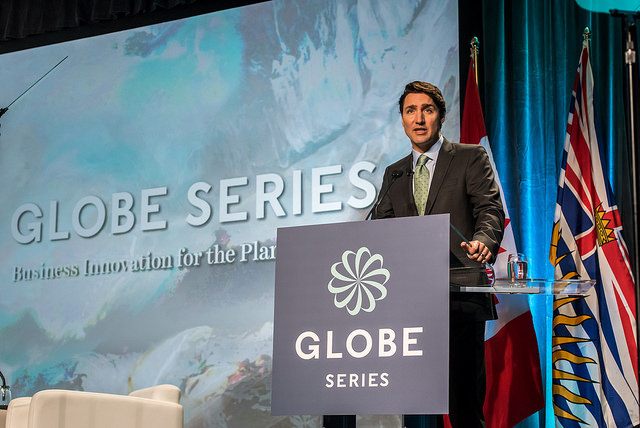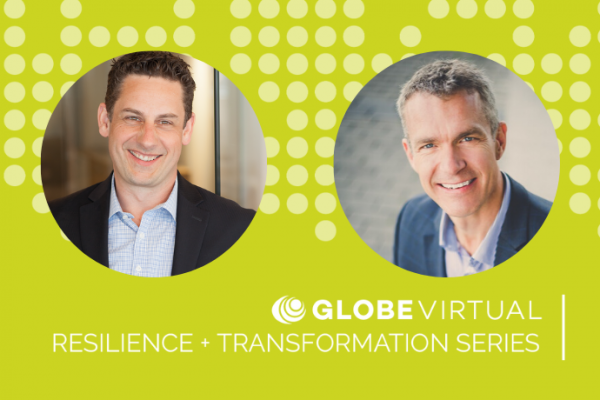In four sessions, a slew of industry, academia, and civil society thought leaders dug into the megatrends that are driving the creation of a stronger, more equitable, and resilient world. The conversations addressed eco-asset management, food security, water integrity, and waste reduction.
Here, we’ve compiled a few highlights:
Megatrend 1: Eco-Asset Management
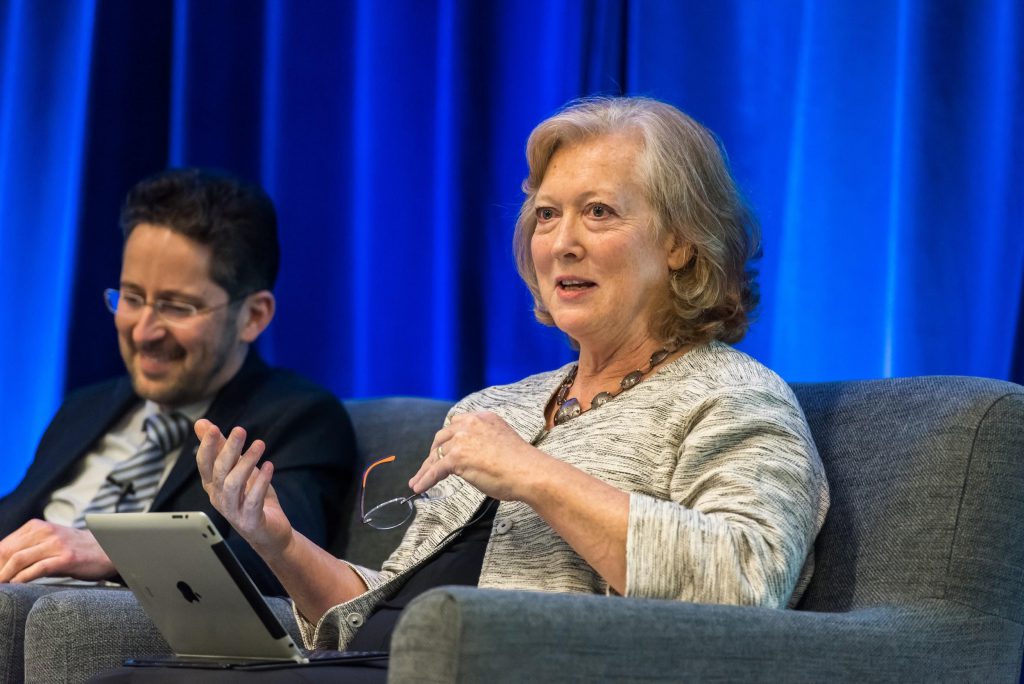 Emanuel Machado, chief administrative officer, Town of Gibsons, with Karen Clarke-Whistler, chief environment officer at TD Bank Group.
Emanuel Machado, chief administrative officer, Town of Gibsons, with Karen Clarke-Whistler, chief environment officer at TD Bank Group.
Global markets value forests for their timber, oceans for their fish, and rolling hills for the ore that lies beneath. But a growing school of thought and practice assigns tangible financial value to intact, or largely intact ecosystems.
Enter eco-asset management, the emerging practice of assessing and accessing the value that comes with preserving ecosystems, rather than extracting their resources. Here, some of the key observations and learnings:
- “Sponsorship and investment is the new conservation,” noted James Tansey, CEO of NatureBank.
- An investment of just $5 Billion could eliminate 80 percent of global forest loss, Tansey added.
- Richard Mattison, CEO of Trucost, cited a pivotal 1997 study which pegged the market value of the global biosphere in the range of US$16 to 54 trillion per year.
- “These numbers are so big that they are meaningless to most.”
- Standing timber is a liquid asset, but the ecosystem value of a forest is not, noted Tansey.
- But: “We don’t need to monetize the full value of the forest in order for this approach to be helpful – we just need to value it ‘enough’ to slightly outdo the market.”
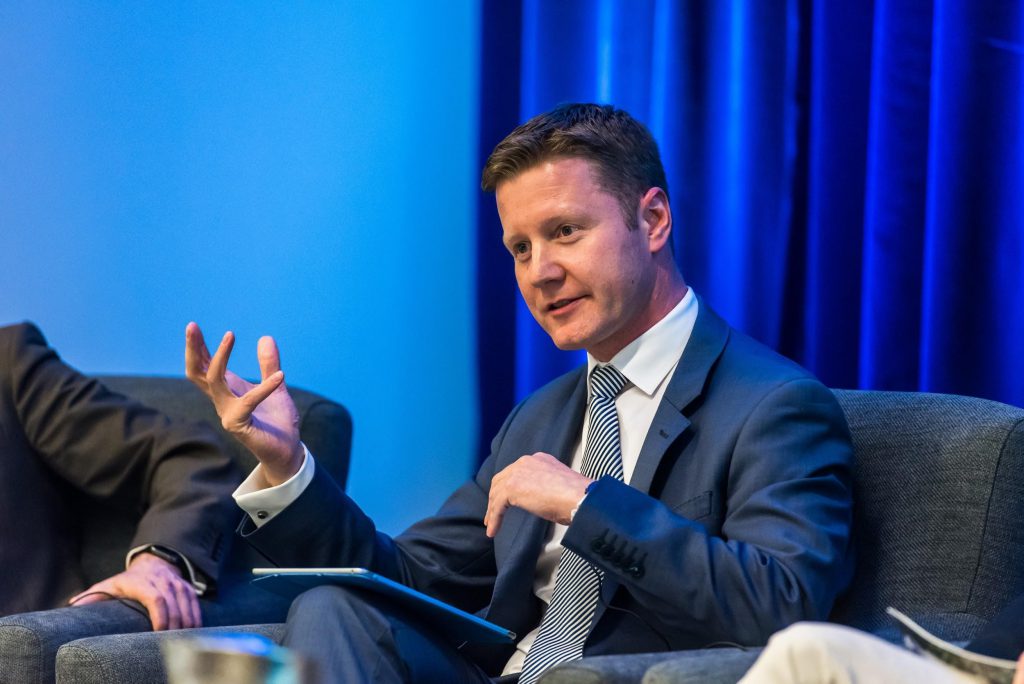
Richard Mattison, CEO, Trucost PLC
- “There are many services that nature provides to its citizens, such as stormwater management and drinking water – nature does a lot of the work for those municipalities, said Emanuel Machado, chief administrative officer with the Town of Gibsons.
- Financial planning rules currently do not allow the explicit valuing of natural capital, one panelist noted.
- Mattison cited British Columbia’s Great Bear Rainforest: “Forest companies are being reimbursed for $10 to 15 million in lost revenue, not from not logging. In return, a much higher natural capital value is preserved.”
- It’s a cop-out to try and claim there is no market demand for an intact ecosystem, one speaker said, because “most consumer demand is manufactured.”
- “It’s early days for valuing natural capital. It is better to create a rough approximation of value than to insist on a precise evaluation that doesn’t get it done.”
- Natural capital approaches do need to be pulled into accounting procedures, but it won’t happen overnight, the panelists agreed. To change a standard takes five to 10 years, one said.
- Before we can get leaders to adopt ecosystem valuation tools, we need to create a shift in values, in order to seed the desire to use the tools.
Megatrend 2: Food Security and Innovation
Can innovation feed the world? It’s a question that needs considering.
By 2050, our Earth’s population will crest nine billion—a 34 percent increase over today’s total. Five years ago, the UN Food and Agriculture Organization predicted that humans will by then need to produce 70 percent more food than we do today. In response, in the past year alone, investors moved some USD$2.06 billion into agricultural technology start-ups. At GLOBE 2016, a few of the leaders set the table.
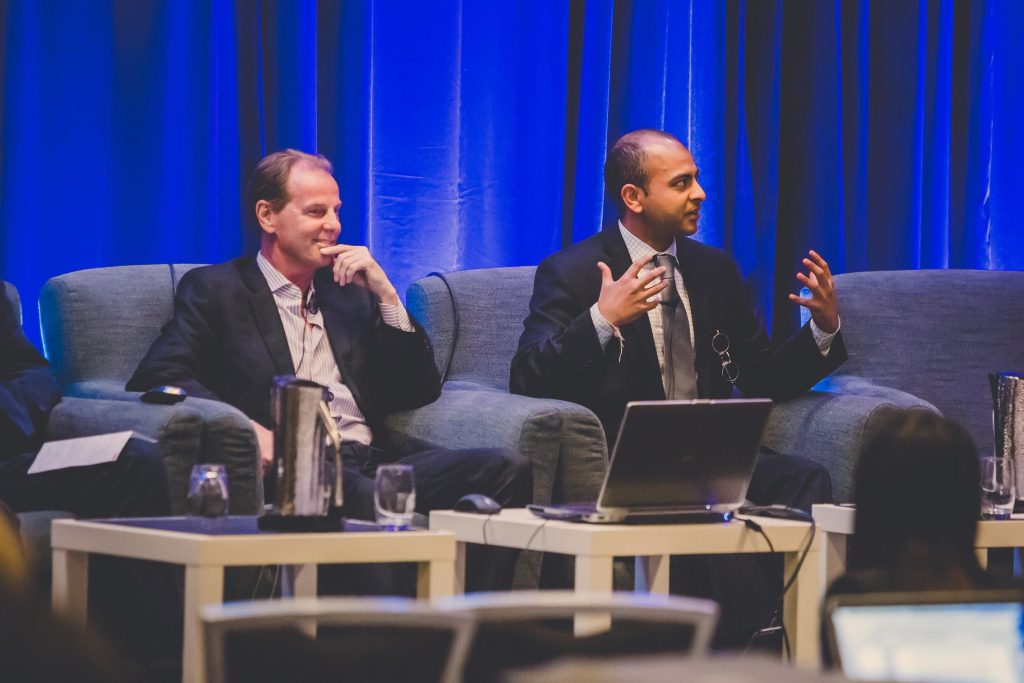
From left, Brad Marchat CEO of Enterra, and FarmX CEO Sanjay Rajpoot.
- Sanjay Rajpoot, CEO of FarmX, is helping farmers embrace technology and engineering so they save money and increase profitability.
Top Tweet:
Sanjay Rajpoot of FarmX @KanagarooKumar #GLOBE2016 pic.twitter.com/D3K4OwZu6h
— Victoria Serda (@torserda) March 4, 2016
- “Scale is vital,” said Wood Turner of Agriculture Capital Management, which owns blueberry, hazelnut, and citrus farms and packing facilities in California. Going big and embracing scale allows his company to ferret out and resolve inefficiencies, he said.
- The locavore movement allows communities to take ownership of food production, Wood Turner said. “We need passionate people on the local level, but we also need to deliver that on a scale that can feed more people.”
- Training people how to farm and tell them to live that lifestyle is hard, said Rajpoot. Not a lot of people can do that. “Technological innovation should happen so that everyone can live that lifestyle.”
- Meanwhile, Vancouver, B.C. based Enterra Feed is commercializing the natural process by which insects feast on food waste by “farming” black soldier fly larvae and using the wriggling critters to feed fish or poultry.
- At Enterra, 36,000 tonnes of food waste yields 5,400 tons of larvae and 2,700 tons of fertilizer. “Insects are professional upcyclers,” said CEO Brad Marchant. “Let’s make food with food.”
- Enterra is adding larva directly to the food chain as fish or chicken feed. Basically, protein to feed the humans (via poultry and fish) and using Larvae poop as crop fertilizer. “People may start eating insects in the near future,” he said. (Side note: See California startup, Bitty Foods).
- Thomas Odenwald, overseas development partner with Community Markets for Conservation, or COMACO, a social enterprise working to reduce poverty in Zambia’s Luangwa Valley. It works to make farming more sustainable than poaching.
- COMACO provides farmer support services, constructing cookstoves and beehives to keep elephants away from crops.If farmers score high on a range of indicators, COMACO buys their products, and sells the produce in Zambian markets—then plows the revenue back into the program.
Megatrend 3: Water Integrity
In this session, panelists and participants wrestled with the issues of water security and integrity, and touched on governance, innovation, and the technologies that will make a difference in securing safe, reliable access to fresh water—the most precious resource.
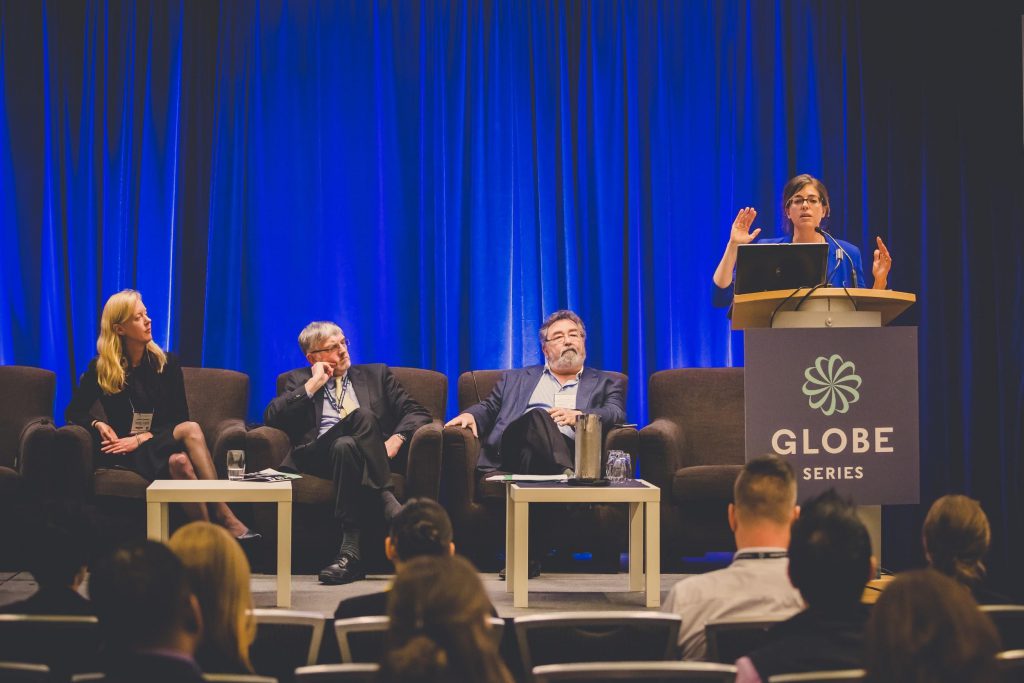
From left: Karen Bakker of the UBC Water Governance Program; Global Institute for Water Security director Howard Wheater; XPV Water Partners managing director John Coburn; Lindsay Bass of the U.S. Corporate Water Stewardship Initiative at WWF.
- John Coburn is managing director with XPV Water Partners—an investment firm focused on high growth water, waste, and environmental businesses.
- He asked a provocative question: “How much water do we use for ourselves, and how much do we leave for a healthy ecosystem?”
- Coburn pointed to the vanishing Aral Sea, Pakistan in 2010, arsenic issues in Bangladesh, and floods in New York. Water connects us all, he stressed.
- Karen Bakker directs the Water Governance Program at the University of British Columbia, and is also a Canada Research Chair. She presented an equation for water security: “Water security equals ecosystem health plus human health.”
- Lindsay Bass leads the U.S. Corporate Water Stewardship Initiative at WWF, and she’s working to put water security on the radar of the private sector.
- Bass: “Sixty percent of companies say water will affect business growth and profitability within five years.”
- Baker said that in the event of a pollution incident, most work is done after the disaster has occurred. “We need to examine water security before an event occurs.”
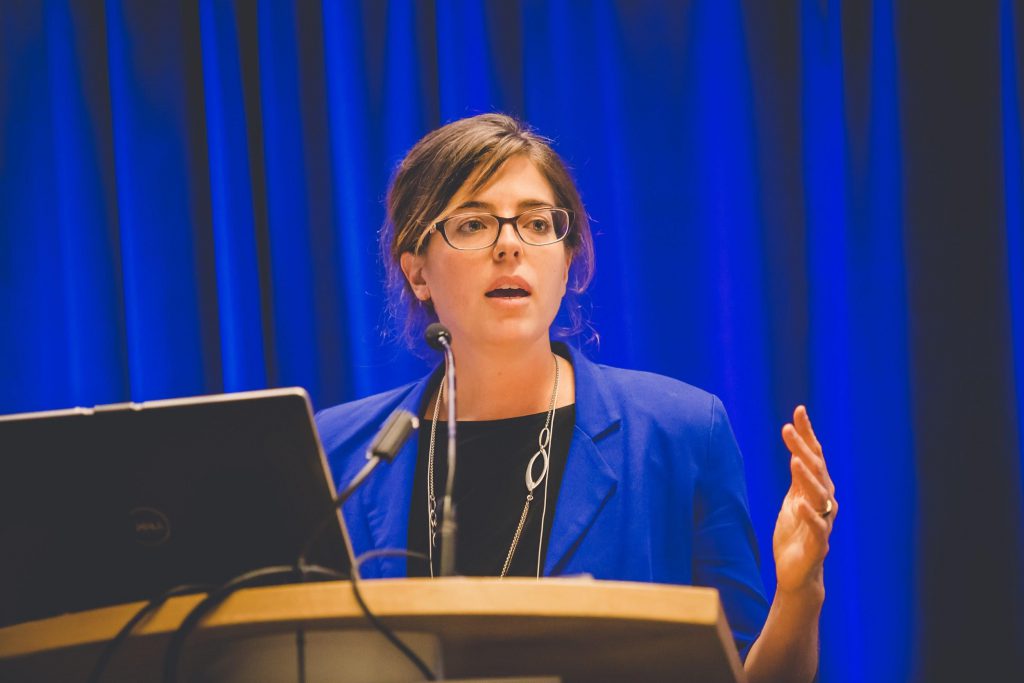
Lindsay Bass of WWF
- Bass cited Levi Strauss & Co. as an example of a company that is a true water stewardship and environment champion.
- Coburn said landscape will change dramatically in the next few decades, but few seem to understand the significance: “Canada is sleepwalking into an uncertain future. We urgently need national flood forecasting, and smarter technology for land and water management.”
Top Tweet:
Water Integrity talk at #GLOBE2016 featured WWF @saybass and @DrKarenBakker comments on value of providing real-time data. @ApanaH2O does
— Tom Doll (@tomdoll_1) March 4, 2016
- Bass proposed “water basin report cards” for companies, so they know what needs to be done.
Megatrend 4: Waste Prevention and the Circular Economy
Preventing waste is one of humanity’s most urgent issues, but also a powerful lever for change – with significant benefits for businesses, governments and citizens striving to boost sustainability and achieve ambitious climate goals. This session convened policymakers, business leaders, entrepreneurs, inventors and designers to talk through the current best practices in waste reduction, and advance durability, disassembly, and sharing.
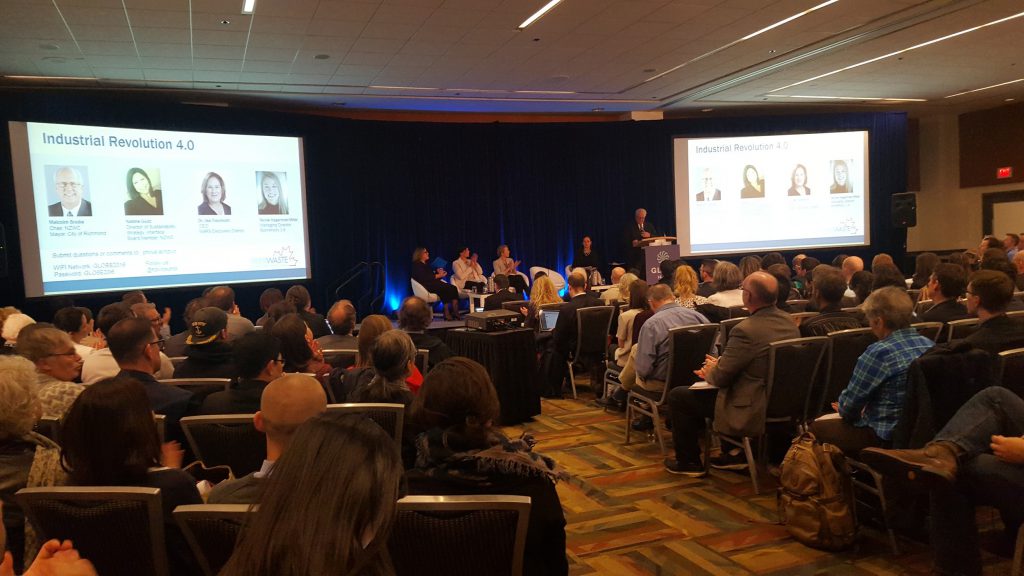
The National Zero Waste Council kindly sponsored this session, Industrial Revolution 4.0 – How Waste Prevention Can Boost the Bottom Line and Drive Circular Economy Innovation. Dagmar Timmer, the managing director of strategic initiatives at One Earth Initiative kept everything running like an elegant closed-loop system. The council recorded a video of this session and made it available.
A few highlights:
- Malcolm Brodie, the chair of the National Zero Waste Council, said that resource scarcity will ultimately drive new practices in businesses.
- “Nature has been creating a zero waste lifestyle for 3.8 billion years,” said Nicole Hagerman-Miller, managing director of Biomimicry 3.8. “Nature has been practicing the circular economy since its inception.”
- Nadine Gudz, Director of Sustainability Strategy, at Interface: “Interface is a restorative enterprise, it seeks to do more good, and eliminate harm. This has never been a flavour of the month for us.”
- Interface uses closed-loop processes, renewable energy, and resource-efficient transportation. Redesigning commerce: “As a global company we ask, what is our obligation to effect broader systems change as an leader in the circular economy?”
- “Our traditional industrial systems are broken and we have an opportunity to model a new one based on more on the principles of the natural world.”
- Gudz said Interface has saved more than $500 million in water efficiency measures alone since 1995. Interface looked to nature to eliminate carpet glues.
- Ilse Treurnicht, CEO, MaRS Discovery District says the regulatory environment has not kept pace with the innovation. “We still have the elephant in the room of what you can do locally and the increasingly complexity of products and global supply chains. What role can we play in influencing the production of goods, particularly electronic waste that is not made here. The pace of change encourages disposability. It is a complex mix of things that can be repurposed and those that can’t.”
- “At heart of the innovation challenge is that it is a system level innovation challenge, no single party can own it or fix it, whether as user, producer, or waste manager,” said Treurnicht. “The only way we are going to make progress if we think about this as a system. There is a new way to convene the system and be selective about choosing interventions.”
- “We can have lots of cute experiments, but if we are serious about addressing this we need to design system level innovations at scale.”
- Treurnicht repeated the mantra of the circular economy: “If you make it, make it efficiently as possible. Make the material as useful as possible, and before you make it, think hard about whether you need to make it at all.”
Visit our Gallery and flickr accounts for GLOBE 2016 images and our YouTube channel for GLOBE 2016 videos.

